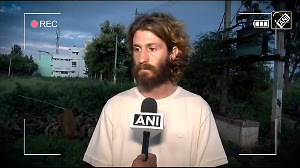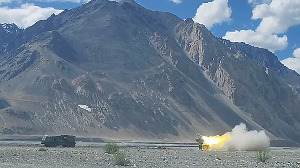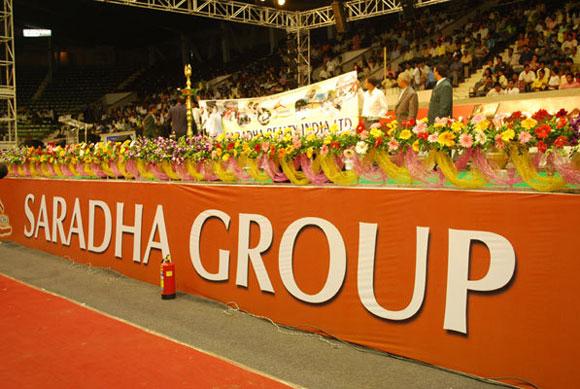
What is the Saradha scam all about, who are the main players behind it? Indrani Roy/Rediff.com presents an faq.
West Bengal Chief Minister Mamata Banerjee and her ministers won't forget 2014 in a hurry.
With prominent Trinamool Congress leaders and associates arrested by the Central Bureau of Investigation during the year for their alleged involvement in the Rs 24.60 billion Saradha chit fund scam, Banerjee and her team have had their hands full to insulate the government and the party from the damage that this scandal has caused.
According to highly placed sources, investigators have received important leads following West Bengal Sport and Transport Minister Madan Mitra's arrest.
Mitra, sources claim, has disclosed some 'big' names to the investigators.
Who are these so-called biggies?
Will the Saradha scam probe knock at the West Bengal chief minister's door?
Is there any link between Saradha and the Burdwan blast?
Everyone has questions on the Saradha scam. Here are some answers.
Should Mamata Banerjee own up moral responsibility for the scam?
The West Bengal chief minister and her party leaders refused to own up responsibility for the Saradha scam, stating that the group came into being in 2006 when the Left Front was in power in the state.
That fact none can deny. But...
According to a report published by the Special Investigation Team set up by the West Bengal government, Saradha's annual collections went up from Rs 15 million at inception to Rs 10.08 billion in 2011-12 and Rs 8.5 billion in 2012-13, when Banerjee was chief minister.
In 2011-12, the Saradha group spent millions of rupees sponsoring cycles, motorcycles, ambulances etc that Banerjee distributed among the people in Jangalmahal and other backward areas of Bengal.
It was at this time that the state government also issued circulars to only keep newspapers owned by the chit fund group in all government libraries.
Saradha group owner Sudipta Sen would conduct meetings at his office usually past midnight and according to reports, use Kolkata police motorcycles to commute to those late night parleys.
Why did no one in the state administration question Sen?
No one can deny that the group was nurtured with much care during the Trinamool Congress government's tenure. And for, Mamata Banerjee needs to own up responsibility.
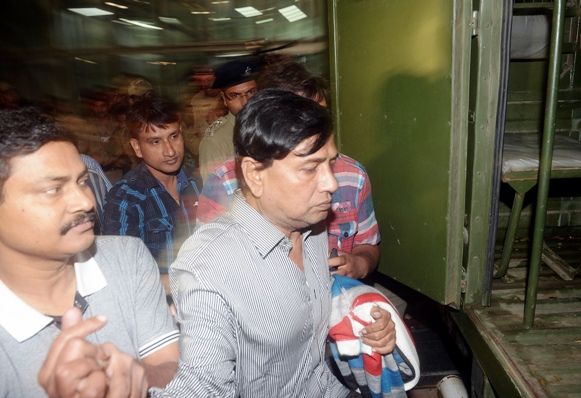
Did Mamata Banerjee break ties with UPA over the scam?
In November 2012, while opposing the then UPA government's decision to introduce foreign direct investment in the retail sector, Banerjee was adamant about moving a no-confidence motion against the ruling alliance.
She even expressed her intent to support a no-trust motion moved by the Left parties, her bitter political enemies.
Interestingly, political analysts then read Banerjee's move as her last resort to stand up against several probes launched by the Centre against her party colleagues and aides.
According to observers, Banerjee was under pressure from investigations against a company owned by a TMC Rajya Sabha member and also against various chit funds in West Bengal, especially Saradha.
To quote Congress leader and advocate Arunava Ghosh, 'Mamata had no other option but to leave the coalition. She must have realised that the game was over.'
And to add to Banerjee's discomfiture, the Supreme Court ordered the CBI to investigate the Saradha case in May 2014, while the UPA government was on its last legs.
So, while FDI in retail may have given a face-saver to exit UPA, many believe the real reason was the scam.
How much does TMC MP Kunal Ghosh know?
Soon after the Saradha scandal surfaced, the West Bengal chief minister had steadfastly defended Ghosh, saying that 'he was only the chief executive officer of Saradha's media group and that he should not be dragged into the case.'
However, the Trinamool Congress wasted no time in suspending Ghosh when he told a public event that he was being made a scapegoat in the Saradha case.
At the same event, Ghosh also mentioned that the Saradha scam should be probed by the CBI.
The obvious question that arises is: If Ghosh was guilty, why did Banerjee defend him initially?
Ghosh claimed to be in possession of some 'explosive' video clips and documents that were sure to 'nail' some important people.
The Special Investigation Team formed by the West Bengal government arrested Ghosh in November 2013 soon after he posted the names of 12 people, who were ‘involved’, on his Facebook page.
The list included names of four TMC members of Parliament as well as the West Bengal chief minister.
Did Ghosh’s arrest become ‘necessary’ as he knew too many ‘uncomfortable details’?
While in custody, Ghosh has stood by his allegations and repeatedly made scornful remarks about the chief minister and her aides.
The CBI recently recorded his versions on orders of the court, but in-camera. Will it come out? Let's see.
Was Sudipta Sen’s media business an attempt to exert influence over the government?
In a 18-page letter that Sudipta Sen allegedly wrote to the CBI before fleeing Kolkata in April 2013, he mentioned that his finances started dwindling ever since he entered the media business.
Though there are doubts if the letter was actually penned by him, Sen repeated the same words while being interrogated by the CBI, sources told Rediff.com.
In fact, he is learnt to have regretted wasting his time over ‘unsuccessful’ media ventures, sources added.
According to investigators, Sen had floated newspapers and channels to ‘impress’ the powers that be and had sought their ‘unconditional assistance’ to run his other businesses.
It was also ‘arranged’ that only people close to the chief minister, like Kunal Ghosh (he used to draw a monthly salary of Rs 17-18 lakh) or Srinjoy Bose (another TMC member of Parliament now in CBI custody) would run such media organisations.
These media houses thereafter became unofficial mouthpieces of the TMC before and after it came to power in West Bengal.
In an interview to rediff.com a few hours prior to his arrest, Kunal Ghosh claimed that at a meeting with Mamata Banerjee, (Sudipta) Sen had assured her: “Didi, apni CM theke PM hoben, ami media house ke seibhabei sajachchhi (Didi, I am setting up my media houses in a way that it helps you become the PM).”
Ghosh stood by this statement during CBI interrogations and referred to this ‘dubious’ meeting that allegedly took place at Deolo near Kalimpong.
According to investigators, Ghosh had stated that apart from (Mamata) Banerjee and (Sudipta) Sen, TMC general secretary Mukul Roy had attended the Deolo meeting.
Surprisingly, neither Banerjee nor anyone from the TMC camp has ever countered Ghosh’s allegations.
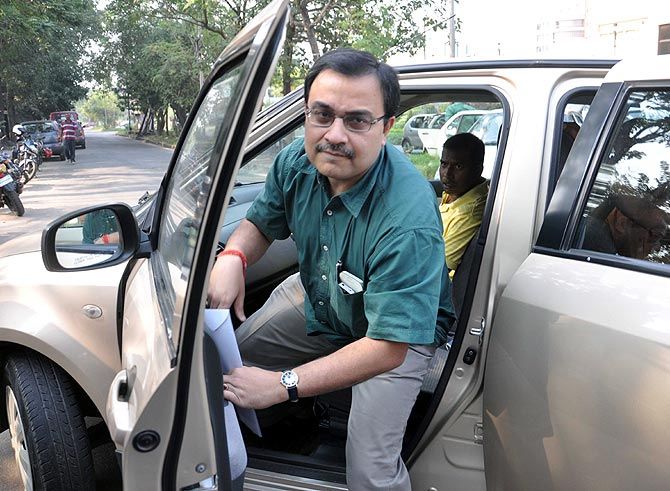
Did Sudipta Sen buy Mamata’s painting for Rs 1.8 crore?
This is another area which has failed to extract a single quote from the corridors of power in West Bengal.
During the Lok Sabha poll campaign, Prime Minister Narendra Modi had alleged that one of Mamata's paintings was sold for Rs 1.8 crore and that it was purchased by (Sudipta) Sen.
Though Sen during a brief interaction with the media on the way to court denied the charge, the income-tax returns filed by Trinamool Congress corroborated such a ‘deal’, sources told rediff.com.
Banerjee’s detractors claimed that Sen’s denial was not spontaneous but forced.
The investigators will come up with a statement about this ‘transaction’ once they have concrete proof, sources told rediff.com.
Why did Banerjee oppose the CBI probe into the scam?
Saradha as a group had its wings spread across several states.
When the apex court ordered a CBI probe, no other state but West Bengal expressed resentment.
Reason?
According to political analysts, Banerjee knew well that some of ‘her most trusted men were involved in the scam’.
Therefore, she preferred her own SIT doing the ‘job under her aegis’ than a central team.
Interestingly, the SIT only filed first information reports against (Sudipta) Sen, (Kunal) Ghosh and arrested six Saradha group officials.
It failed to arrest Sen's wife Piyali and son Subhojit for a whole year.
“The SIT was only interested in hoodwinking the people. Their probe was a futile exercise, a farce,” Communist Party of India-Marxist leader Sujan Chakraborty told rediff.com.
“The SIT was supposed to investigate a money laundering case but it failed to do so and ended up wasting taxpayers’ money,” he added.
The SIT initially refused to cooperate with the Enforcement Directorate, sources told rediff.com.
"It declined to hand over a diary (with a detailed list of deals) that (Sudipta) Sen kept mentioning during interrogation," an investigator told rediff.com.
Another investigation tool set up by West Bengal chief minister, the Justice Shyamal Sen Commission, entrusted with giving partial compensation to the depositors, completed its term rather unceremoniously after it faced a severe fund crunch.
Since the commission’s formation, it had received 12.5 lakh applications from the depositors of Saradha group.
The commission managed to issue cheques to about 500,000 depositors spending Rs 300 crore approximately.
In April, 2013, Mamata announced a Rs 500 crore relief fund to compensate the Saradha fraud victims.
The chief minister had raised value-added tax on cigarettes to 25 per cent from 15 per cent, which would generate Rs 150 crore for the relief corpus.
But the money thus collected was too meagre to keep the compensation fund alive.
The Shyamal Sen Commission, therefore, turned out to be a total failure.
The chief minister, however, never uttered a word about either the SIT’s ‘incapability’ or the Shyamal Sen Commission’s ‘insufficiency’.
To her, ‘the investigation was satisfactory’ and a CBI probe was ‘uncalled for’.
She went out of her way to resist the central investigation team from ‘interfering’ so much so that in a bizarre set of events, West Bengal Law Minister Chandrima Bhattacharya, along with few other TMC leaders, were seen sitting in dharna at the CBI’s Kolkata office campus in protest.
What is Madan Mitra’s connection with Saradha?
Mitra is one of Mamata’s closest aides.
The CBI had summoned him many times but he ‘failed’ to appear on account of ‘bouts of illness’.
Sprinting from a private nursing home to a government hospital, he finally ran out of excuses and was arrested by the CBI recently.
Reason?
Mitra was seen praising (Sudipta) Sen’s ‘investment’ companies on various audio visual media clips. He was the chief of the staff union of Sen’s companies and had allegedly taken a huge amount of money from him over the last few years on various pretexts.
The cars that he and his family use were reportedly ‘gifts’ from Sen, who also allegedly paid for their fuel and maintenance.
“As a member of the legislative assembly, Mitra’s monthly salary was about Rs 30,000. But during his son’s wedding, he invited 10,000 guests and cost of each food plate was Rs 2,000. Where did he get all that money from?” a former TMC member of Parliament told rediff.com.
Mitra allegedly amassed huge wealth over the past few years and the investigators are now busy making a list of his assets.
(Sudipta) Sen is learnt to have told the sleuths that he ventured into realty projects on Mitra’s assurance.
He is learnt to have revealed names of ‘very important’ TMC people during interrogation.
Some of these biggies will soon be summoned by the central agency, sources told rediff.com.
Why did Mamata take to the streets after Madan Mitra’s arrest?
Mitra’s arrest, quite expectedly, elicited the most vehement protests from the West Bengal chief minister. She not only made scathing remarks against the central government and the CBI but also led a rally in protest against Mitra’s arrest.
While political analysts described this move by the chief minister as ‘unconstitutional’, her rivals saw it as an attempt ‘to assure (Madan) Mitra to stay put and not divulge any secret to the investigators.’
Will the TMC general secretary Mukul Roy be summoned by CBI?
Almost all the media houses of Bengal are certain that after (Madan) Mitra, it is Roy’s turn.
While unconfirmed reports suggest that those held by the CBI have taken Roy’s name on several occasions, a recent report in Ananda Bazaar Patrika stated that (Sudipta) Sen’s plan to flee Kolkata was orchestrated by none other than Roy.
The report also mentioned that Roy was in touch with Sen and his colleague Debjani Mukherjee as they moved from one place to another.
The TMC general secretary allegedly made 86 calls to Sen during his 14-day run from the law before he was held from Sonmarg in Kashmir in April 2013, the ABP report added.
In her statements to the CBI, Sen’s associate (Debjani) Mukherjee had revealed that (Sudipta) Sen had held talks with (Mukul) Roy at Kolkata’s Nizam Palace and also in New Delhi while he was on the run, sources told rediff.com.
Mukherjee is also learnt to have told the investigators that Roy was very eager to finalise a takeover of all of Sen’s loss-making media ventures.
One wonders why Roy was so keen to let TMC take charge of Sen’s media establishments.
Was Saradha money used to fund Jamaat-ul-Mujahideen terror modules in Bengal?
The National Investigation Agency and the CBI are looking into allegations that Ahmed Hassan Imran, TMC’s Rajya Sabha MP, had sent Saradha funds to Jamaat-ul-Mujahideen modules whose existence came to the fore after a blast took place in a house at Khagragarh in Burdwan district.
It is alleged by Mamata’s detractors in India and political analysts in Bangladesh that Imran transferred Saradha scam money to these JMB modules.
The investigators had summoned him for questioning soon after the blast.
According to media reports, Imran is the co-founder of Students Islamic Movement of India at the Aligarh Muslim University in Uttar Pradesh and became the president of its Bengal unit.
Though he quit his post in 1980, he remained a spokesperson of SIMI till it was banned in 2001.
In 1981, he started publishing Kalom, a monthly Bengali journal of SIMI. Launched as a monthly magazine, Kalom turned into a newspaper after the Saradha group bought it in 2011. Kalom was owned by the Saradha group till 2013.
After Saradha group went bust, Kalom was bought by Kalom Welfare Association.
It was one of the newspapers that (Mamata) Banerjee dictated all state government libraries should subscribe to.
Does it prove anything? No, it doesn't.
Who else are on the CBI, ED radar?
The investigators have already questioned painter Suvaprasanna (once known to be very close to the chief minister) and West Bengal Textile Minister Shyamapada Mukherjee for their ‘dubious’ deals with (Sudipta) Sen.
Suvaprasanna allegedly sold a television channel, which was never launched, at a price much higher than the existing rates while Mukherjee ‘sold’ a government-owned plot of land along with a cement factory to Saradha group again for an astronomical amount.
Postscript
With each passing day, investigators dig deeper into the Saradha scam and new revelations send shock waves across Bengal.
While Banerjee and her team refute charges hurled at them, their political foes cry foul.
But neither the state government nor the Opposition parties can offer any hope to about 17 lakh investors who invested in Sudipta Sen’s company.










